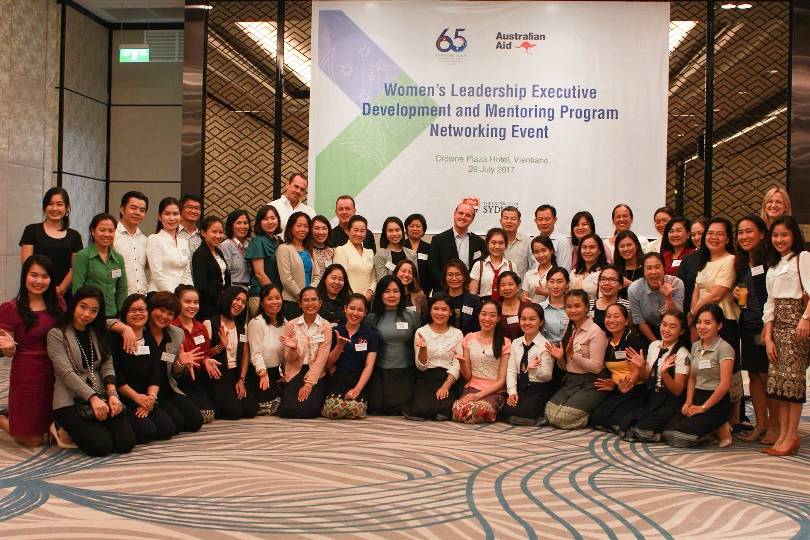Women’s Leadership Executive Development and Mentoring Program
Remarks by Senior Gender Equality Specialist, Annemarie Reerink
27 July 2017
I am very pleased to be here with you this morning, for the beginning of Australia’s Women’s Leadership Executive Development and Mentoring Program in Laos. It is exciting to meet you, as you embark on this wonderful opportunity of strengthening your skills in leadership, strategic planning, management, career guidance and mentoring.

This Program forms part of our efforts to promote women’s leadership in Laos. You may have noticed that the Australian Embassy has invested a lot of energy and effort in keeping in touch with Australia Awards Alumni after their return from studies in Australia. We believe it is especially important for us to help female alumni to make optimal use of the skills and knowledge that they bring back from Australia. Our alumni – meaning you! – are an important asset for Laos as well as for Australia. But we know from studies that female alumni don’t progress in the workplace at the same rate as male alumni. And this is something we need to proactively address.
In Australia, women are still under-represented in elected positions, in positions in public life and in private sector leadership, despite major advances in women’s education. Women face a “glass ceiling” and the gap in wages between women and men is still 23%. This means that for every dollar that a man earns, a woman earns 77 cents. And a substantial part of this cannot be explained by differences in education, skills and experience. At the top, the picture is even worse, with female CEOs earning significantly less than male CEOs.
The picture in Laos is no doubt quite similar, as it is elsewhere in Asia. This is why women’s leadership is one of three pillars in DFAT’s 2016 Gender Equality and Women’s Empowerment Strategy. We recognise the barriers that exist to women’s equal right at advancement, and we see the importance of leadership positions, which can help women to drive change in their societies and to impact policies and practices.
Women’s equal chances at leadership are also important because our societies need to make optimal use of talent. How else can we formulate and implement effective solutions to all the challenges our countries face? Women will often bring a different, perhaps a broader range of ideas to the table, because we have different insights into the needs and interests present in our societies.
It’s clear that it pays off for a society to ensure that women have equal opportunities at leadership, and in the economy it pays off too. Having women at the top has been shown to improve economic performance. When women have a role in management, companies are more innovative and adaptive to new technologies.
This is why we work with the Lao government and the Lao people to help women overcome barriers to leadership. Our Investing in Women’s Leadership Program is geared towards addressing challenges such as skills, networking, and awareness.
When we did our research, we found that many of you placed strong importance on mentoring and guiding others, as being a critical aspect of leadership. We believe it is therefore vital to help you transfer some of your skills to others. This can happen in the workplace but also elsewhere, especially with the people you meet outside work.
We hope you will embrace the opportunity to be a mentor for other women, or to be mentored. We hope you will share your wisdom and your experiences, in the hopes that others will avoid common mistakes and be inspired by you. We hope that being part of a mentoring relationship will give more women the courage to challenge outdated practices and attitudes and promote more equitable structures in the workplace.
Which leads me to the importance of networking. Not everyone is comfortable with networking, and some of us don’t even recognise when we’re doing it. But it’s a key feature of professional advancement. The networks you will create will help further careers. We also hope that these networks will be a sign of new types of leadership. We hope that through this program, you will be part of a new wave of leaders who promote equal opportunities for women and men. Because we see women’s leadership not only as an individual pursuit but also as a collective process of making a difference to institutions and societies as a whole.
And we see this program as a way to create an environment that is conducive to women’s leadership. The momentum that will be created by the training program during the coming months will help to generate positive development, in Vientiane and beyond, for older as well as younger women, for those who have studied overseas and those who have not had that opportunity.
You will have an amazing opportunity to establish a professional network that includes women leaders – some of them leaders in the making. And I am sure that in the process, you will strengthen your skills and gain many practical benefits, professionally as well as personally.
I wish you all the best as you start out on this exciting journey.
